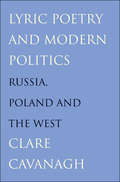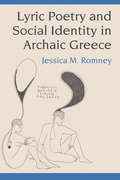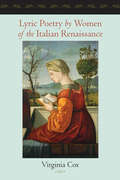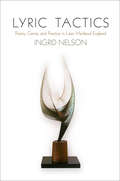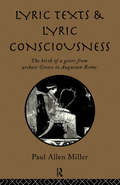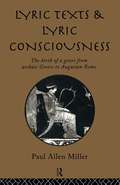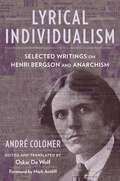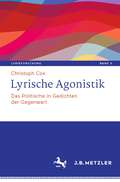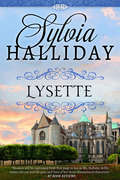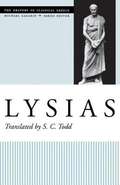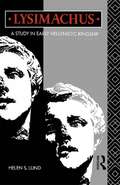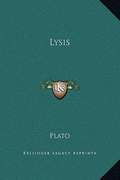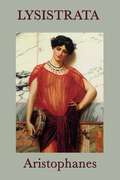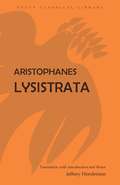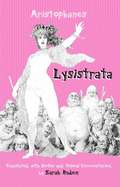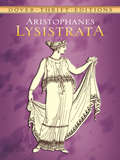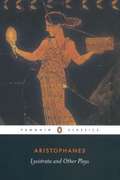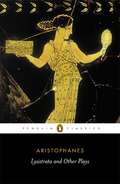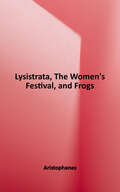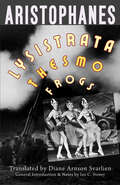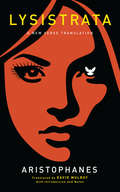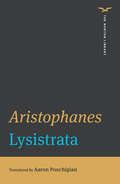- Table View
- List View
Lyric Poetry and Modern Politics
by Clare CavanaghLyric Poetry and Modern Politics explores the intersection of poetry, national life, and national identity in Poland and Russia, from 1917 to the present. As a corrective to recent trends in criticism, acclaimed translator and critic Clare Cavanagh demonstrates how the practice of the personal lyric in totalitarian states such as Russia and Poland did not represent an escapist tendency; rather it reverberated as a bold political statement and at times a dangerous act. Cavanagh also provides a comparative study of modern poetry from the perspective of the eastern and western sides of the Iron Curtain. Among the poets discussed are Blok, Mayakovsky, Akhmatova, Yeats, Whitman, Frost, Szymborska, Zagajewski, and Milosz; close readings of individual poems are included, some translated for the first time. Cavanagh examines these poets and their work as a challenge to Western postmodernist theories, thus offering new perspectives on twentieth-century lyric poetry.
Lyric Poetry and Social Identity in Archaic Greece
by Jessica RomneyLyric Poetry and Social Identity in Archaic Greece examines how Greek men presented themselves and their social groups to one another. The author examines identity rhetoric in sympotic lyric: how Greek poets constructed images of self for their groups, focusing in turn on the construction of identity in martial-themed poetry, the protection of group identities in the face of political exile, and the negotiation between individual and group as seen in political lyric. By conducting a close reading of six poems and then a broad survey of martial lyric, exile poetry, political lyric, and sympotic lyric as a whole, Jessica Romney demonstrates that sympotic lyric focuses on the same basic behaviors and values to construct social identities regardless of the content or subgenre of the poems in question. The volume also argues that the performance of identity depends on the context as well as the material of performance. Furthermore, the book demonstrates that sympotic lyric overwhelmingly prefers to use identity rhetoric that insists on the inherent sameness of group members. All non-English text and quotes are translated, with the original languages given alongside the translation or in the endnotes.
Lyric Poetry by Women of the Italian Renaissance
by Virginia CoxBilingual, annotated edition of more than 200 poems by Italian Renaissance women, many of which have never before been published in English.Outstanding Academic Title, ChoiceLyric Poetry by Women of the Italian Renaissance is the first modern anthology of verse by Italian women of this period to give a full representation of the richness and diversity of their output. Although familiar authors such as Vittoria Colonna, Gaspara Stampa, and Veronica Gambara are well represented, half of the fifty-four poets featured are unknown even to many specialists. Especially noteworthy is an extensive selection of verse from the period following 1560, which has received little or no critical attention. This later, strikingly experimental, proto-Baroque tradition of verse is reconstructed here for the first time.Virginia Cox creates both a scholarly teaching resource and a collection of poetry accessible to general readers with no previous knowledge of the Italian poetic tradition. Each poem is presented in its original language, accompanied by a translation and commentary. An introduction traces the history of Italian lyric poetry from the fifteenth to the seventeenth century. Cox also provides a guide to meter, rhythm, and rhyme, as well as a glossary of rhetorical terms and a biographical dictionary of authors.Organized thematically, this book offers poems about love, religion, and politics; verse addressed to patrons, friends, family, and places; and polemical and correspondence verse. Four languages are represented: Greek, Latin, literary Tuscan of various levels of standardization, and the stylized rustic dialect of pavan. The volume contains more than 200 poems, of which about a quarter have never before been published in a modern edition and more than a third have not previously been available in English translation."Exhaustive and insightful... This is an amazing book, a major achievement in the field of women's studies."—Renaissance Quarterly, reviewing Women’s Writing in Italy, 1400–1650
Lyric Tactics: Poetry, Genre, and Practice in Later Medieval England (The Middle Ages Series)
by Ingrid NelsonWhat shall we make of medieval English lyrics? They have no fixed line or meter, no consistent point of view, and their content may seem misaligned with the other texts in manuscripts in which they are found. Yet in Lyric Tactics, Ingrid Nelson argues that the lyric poetry of later medieval England is a distinct genre defined not by its poetic features—rhyme, meter, and stanza forms—but by its modes of writing and performance, which are ad hoc, improvisatory, and situational. Nelson looks at anonymous devotional and love poems that circulated in manuscripts of practical, religious, and literary material or were embedded in popular, courtly, and liturgical works. For her, the poems' abilities to participate in multiple modes of transmission are "lyric tactics," responsive and contingent modes of practice that emerge in opposition to institutional or poetic norms.Working across the three languages of medieval England (English, French, and Latin), Nelson examines the tactics of poetic voice in the trilingual texts of British Library MS Harley 2253, which contains the well-known English "Harley lyrics." In a study of the English hymns and French lyrics of the commonplace book of William Herebert, she unearths the moral implications of lyric tactics for the friars who produced and disseminated them. And last, she examines the work of Geoffrey Chaucer and shows how his introduction of Continental poetic forms such as the balade and the rondeau suggests continuity with rather than a break from earlier English lyric. Combining literary analysis, manuscript studies, and cultural history with modern social theory, Ingrid Nelson demonstrates that medieval lyric poetry formed a crucial part of the fabric of later medieval English society.
Lyric Texts & Consciousness: The Birth Of A Genre From Archaic Greece To Augustan Rome
by Paul Allen MillerFirst published in 1994. Routledge is an imprint of Taylor & Francis, an informa company.
Lyric Texts and Lyric Consciousness: The Birth of a Genre from Archaic Greece to Augustan Rome
by Paul Allen MillerLyric Texts and Lyric Consciousness presents a model for studying the history of lyric as a genre. Prof Miller draws a distinction between the work of the Greek lyrists and the more condensed, personal poetry that we associate with lyric. He then confronts the theoretical issues and presents a sophisticated, Bakhtinian reading of the development of the lyric form from its origins in archaic Greece to the more individualist style of Augustan Rome. This book will appeal to classicists and, since English translations of passages from the ancient authors are provided, to those who specialise in comparative literature.
Lyrical Individualism: Selected Writings on Henri Bergson and Anarchism (Columbia Themes in Philosophy, Social Criticism, and the Arts)
by Andre ColomerIn the early twentieth century, André Colomer was perhaps the best-known figure in the anarchist movement. A poet, philosopher, activist, and public speaker, he was enmeshed in the Parisian political and artistic scene at a time of political and cultural revolution. Amid the avant-garde explosions of Cubism, futurism, and surrealism and the ferment of radical politics on left and right, Colomer became anarchism’s leading advocate. He galvanized the Parisian public through his agitational writing and organizing, as well as his involvement in a sensational murder case, while developing a distinctive philosophical account of anarchist individualism. Yet Colomer died in obscurity in Moscow, abandoned by his friends and comrades, and is scarcely known in the English-speaking world today.Lyrical Individualism presents a selection of Colomer’s crucial writings, with a focus on anarchist theory and the philosophy of Henri Bergson. It reveals the richness of Colomer’s philosophical work, particularly his creative engagement with Bergson, Max Stirner, and Friedrich Nietzsche to forge a novel anarchist ideology. Colomer’s writings not only offer valuable insights into interwar anarchism, they also present a distinctive philosophical vision that in many ways anticipates theories and debates animating radical political movements today. This book also showcases his acerbic and pugnacious political commentary on the turbulent events of the 1910s and 1920s. The first translation and publication of Colomer’s work since his untimely death in 1931, Lyrical Individualism allows a range of readers to discover this vital thinker.
Lyrics of Sunshine and Shadow: The Tragic Courtship and Marriage of Paul Laurence Dunbar and Alice Ruth Moore
by Eleanor AlexanderA New York Times Notable Book of 2002!Traces the tempestuous romance of Lice Ruth Moore and Paul Laurence Dunbar, early 20th century's most noted African-American literary coupleOn February 10, 1906, Alice Ruth Moore, estranged wife of renowned early twentieth-century poet Paul Laurence Dunbar, boarded a streetcar, settled comfortably into her seat, and opened her newspaper to learn of her husband's death the day before. Paul Laurence Dunbar, son of former slaves, whom Frederick Douglass had dubbed "the most promising young colored man in America," was dead from tuberculosis at the age of 33. Lyrics of Sunshine and Shadow traces the tempestuous romance of America's most noted African-American literary couple. Drawing on a variety of love letters, diaries, journals, and autobiographies, Eleanor Alexander vividly recounts Dunbar's and Moore's tumultuous affair, from a courtship conducted almost entirely through letters and an elopement brought on by Dunbar's brutal, drunken rape of Moore, through their passionate marriage and its eventual violent dissolution in 1902. Moore, once having left Dunbar, rejected his every entreaty to return to him, responding to his many letters only once, with a blunt, one-word telegram ("No"). This is a remarkable story of tragic romance among African-American elites struggling to define themselves and their relationships within the context of post-slavery America. As such, it provides a timely examination of the ways in which cultural ideology and politics shape and complicate conceptions of romantic love.
Lyrische Agonistik: Das Politische in Gedichten der Gegenwart (Lyrikforschung. Neue Arbeiten zur Theorie und Geschichte der Lyrik #3)
by Christoph CoxAusgehend von der These, dass es sich bei der politischen Lyrik der Gegenwart vor allem um eine Lyrik des Politischen, eine lyrische Streitkultur handelt, wird in „Lyrische Agonistik. Das Politische in Gedichten der Gegenwart“ auf der Basis einer philosophischen ‚neue‘ Rhetorik und mit Rückbezug auf Ansätze der radikalen Demokratietheorie insbesondere von Chantal Mouffe und Ernesto Laclau eine neuartige rhetorische Methode zur Analyse des Politischen in der Lyrik der Gegenwart entwickelt. Grundlegend für diese Methode ist die von sophistischer Rhetoriktradition und radikaler Demokratietheorie geteilte Skepsis gegenüber allen epistemischen Letztbegründungsversuchen. Das Politische in der Lyrik der Gegenwart erweist sich im Kontext dieser beiden Bezugspunkte als die Zurückweisung fundamentaler Gründungversuche, die sich als diskursive Form der Verhandlung einer nur plausiblen, in ihrer Kontingenz stets angreifbaren Politik äußert. Ablesbar wird diese postfundamentalistische Wende in gegenwärtigen Gedichten anhand von rhetorischen Widersprüchen, die auf den unaufhebbaren konflikthaften Charakter des Politischen hindeuten, deren notwendige Gegenseite der ebenso rhetorisch ausgearbeitete Versuch ist, umstrittene Diskurse zugunsten einer nie letztbegründbaren Position zu hegemonisieren. Aufgezeigt wird das dem Politischen eigene Spiel aus Kontingenzerfahrung und Schließungsbemühungen anhand von drei disparaten Textbeispielen politischer Lyrik der letzten zehn Jahre: Tom Schulz’ „Die Maschinen sind volljährig“, Günter Grass’ „Was gesagt werden muss“ und Monika Rincks „was machen die frauen am sonntag?“.
Lysenko's Ghost: Epigenetics and Russia
by Loren GrahamLysenko became one of the most notorious figures in twentieth-century science after his genetic theories were discredited decades ago. Yet some scientists now claim that discoveries in epigenetics prove that he was right after all. Loren Graham reopens the case, to determine whether new developments in molecular biology validate Lysenko's claims.
Lysette: The French Maiden Series - Book Two (The French Maiden Series #2)
by Sylvia HallidayAn award-winning author “deftly evokes the era and the pain and lives of her three-dimensional characters” in a romance set during the French Revolution (RT Book Reviews). Lysette, the Marquise de Ferrance, is left penniless after her husband dies. With nowhere else to turn—and as Paris becomes increasingly dangerous—she ventures across the turbulent French countryside to the safety of her brother’s home. But when she meets Andre, Comte du Crillon, her plans change. She cares not that he’s married. Using her beauty as her weapon, she sets out to seduce him. Yet all the while there’s another man in her midst—a man of action and iron will—waiting for the perfect time to take her for himself. For it is in his arms that Lysette is destined to find the sanctuary and true love that she seeks.
Lysias
by S. C. ToddThis is the second volume in the Oratory of Classical Greece series. Planned for publication over several years, the series will present all of the surviving speeches from the late fifth and fourth centuries B.C. in new translations prepared by classical scholars who are at the forefront of the discipline. These translations are especially designed for the needs and interests of today's undergraduates, Greekless scholars in other disciplines, and the general public.<P><P>Classical oratory is an invaluable resource for the study of ancient Greek life and culture. The speeches offer evidence on Greek moral views, social and economic conditions, political and social ideology, and other aspects of Athenian culture that have been largely ignored: women and family life, slavery, and religion, to name just a few.
Lysimachus: A Study in Early Hellenistic Kingship
by Dr Helen Lund Helen S. LundAlthough shortlived, Lysimachus' Hellespontine empire foreshadowed those of Pergamum and Byzantium. Lund's book sets his actions significantly within the context of the volatile early Hellenistic world and views them as part of a continuum of imperial rule in Asia minor. She challenges the assumption that he was a vicious, but ultimately incompetent tyrant.
Lysis
by PlatoNo answer is given in the Lysis to the question, ‘What is Friendship?’ any more than in the Charmides to the question, ‘What is Temperance?’ There are several resemblances in the two Dialogues: the same youthfulness and sense of beauty pervades both of them; they are alike rich in the description of Greek life. The question is again raised of the relation of knowledge to virtue and good, which also recurs in the Laches; and Socrates appears again as the elder friend of the two boys, Lysis and Menexenus. In the Charmides, as also in the Laches, he is described as middle-aged; in the Lysis he is advanced in years. The Dialogue consists of two scenes or conversations which seem to have no relation to each other. The first is a conversation between Socrates and Lysis, who, like Charmides, is an Athenian youth of noble descent and of great beauty, goodness, and intelligence: this is carried on in the absence of Menexenus, who is called away to take part in a sacrifice. Socrates asks Lysis whether his father and mother do not love him very much? ‘To be sure they do.’ ‘Then of course they allow him to do exactly as he likes.’ ‘Of course not: the very slaves have more liberty than he has.’ ‘But how is this?’ ‘The reason is that he is not old enough.’ ‘No; the real reason is that he is not wise enough: for are there not some things which he is allowed to do, although he is not allowed to do others?’ ‘Yes, because he knows them, and does not know the others.’ This leads to the conclusion that all men everywhere will trust him in what he knows, but not in what he does not know; for in such matters he will be unprofitable to them, and do them no good. And no one will love him, if he does them no good; and he can only do them good by knowledge; and as he is still without knowledge, he can have as yet no conceit of knowledge. In this manner Socrates reads a lesson to Hippothales, the foolish lover of Lysis, respecting the style of conversation which he should address to his beloved. After the return of Menexenus, Socrates, at the request of Lysis, asks him a new question: ‘What is friendship? You, Menexenus, who have a friend already, can tell me, who am always longing to find one, what is the secret of this great blessing.’
Lysistrata
by AristophanesAristophanes' play, Lysistrata, takes place toward the end of the Peloponnesian War and centers on the lives of the soldiers' wives. One woman, Lysistrata, under the impression that a man's libido is ultimately his driving force in life, comes up with an interesting peace solution: to deny their husbands sexual relations until they can settle on a peace agreement that will end the war. However, Lysistrata's strategy effectively creates even more war than before as the sexes begin to feud with each other. Aristophanes' play is both comic and poignant as it reveals the relationship between men and women in classical Athens society.
Lysistrata
by Aristophanes Jeffrey HendersonThis English translation of Aristophanes' most popular comedy will appeal to the modern reader because of its lively and imaginative plot, memorable heroine, good jokes, and appeal for peace and tolerance between nations and between the sexes. This edition includes background material on the historical and cultural context of this work, suggestions for further reading, notes, and a map. The Focus Classical Library provides close translations with notes and essays to provide access to understanding Greek culture and the roots of contemporary thought.
Lysistrata
by Aristophanes Sarah RudenThis rollicking new translation of Aristophanes' comic masterpiece is rendered in blank verse for dialogue and in lyric meters and free verse for the songs. Appended commentary essays--on Athenian democracy, ancient Greek warfare, Athenian women, and Greek Comedy--offer lively and informative discussions not only of Aristophanes, but of the broader fifth-century social, political, and cultural context as well.
Lysistrata
by AristophanesFirst presented in 411 B.C., this ancient comedy concerns the efforts of Lysistrata, an Athenian woman, to persuade other woman to join together in a strike against the men of Greece, denying them sex until they've agreed to put down their arms and end the disastrous wars between Athens and Sparta.When the strike begins, and the men respond, the comedic battle of the sexes that ensues makes this spirited play one of the most enjoyable of the classics. In it, Aristophanes employs a mixture of shrewd logic and raffish humor that fully exploits the rich comic potential of the story and its underlying antiwar sentiment. Always a favorite of audiences, Lysistrata, because of its pointed feminist sympathies, is studied and performed today more than ever.
Lysistrata and Other Plays
by Aristophanes Alan H. SommersteinThree plays by the comedian of Ancient Greece Writing at the time of political and social crisis in Athens, Aristophanes was an eloquent yet bawdy challenger to the demagogue and the sophist. The Achanians is a plea for peace set against the background of the long war with Sparta. In Lysistrata a band of women tap into the awesome power of sex in order to end a war. The darker comedy of The Clouds satirizes Athenian philosophers, Socrates in particular, and reflects the uncertainties of a generation in which all traditional religious and ethical beliefs were being challenged. <P><P> For more than seventy years, Penguin has been the leading publisher of classic literature in the English-speaking world. With more than 1,700 titles, Penguin Classics represents a global bookshelf of the best works throughout history and across genres and disciplines. Readers trust the series to provide authoritative texts enhanced by introductions and notes by distinguished scholars and contemporary authors, as well as up-to-date translations by award-winning translators.
Lysistrata and Other Plays: The Acharnians, The Clouds, Lysistrata
by AristophanesThe Acharnians/The Clouds/Lysistrata'We women have the salvation of Greece in our hands'Writing at a time of political and social crisis in Athens, the ancient Greek comic playwright Aristophanes was an eloquent, yet bawdy, challenger to the demagogue and the sophist. In Lysistrata and The Acharnians, two pleas for an end to the long war between Athens and Sparta, a band of women on a sex strike and a lone peasant respectively defeat the political establishment. The darker comedy of The Clouds satirizes Athenian philosophers, Socrates in particular, and reflects the uncertainties of a generation in which all traditional religious and ethical beliefs were being challenged. Translated with an Introduction and Notes by Alan H. Sommerstein
Lysistrata, The Women's Festival, and Frogs (Oklahoma Series in Classical Culture #Volume Forty-Two)
by Aristophanes Michael EwansMost readers nowadays encounter the plays of Aristophanes in the classroom, not the theater. Yet the "father of comedy" wrote his plays for the stage, not as literary texts. Many English translations of the plays were written decades ago, and in their outdated language, they fail to capture the dramatic liveliness of the original comedies. Now Michael Ewans offers new and lively translations of three of Aristophanes' finest plays: Lysistrata, The Women's Festival, and Frogs. While remaining faithful to the original Greek, these translations are accessible to a modern audience--and actable on stage. Here readers will discover--in all its uncensored glory--the often raw sexual and scatological language Aristophanes used in his fantastically inventive works. <p><p>This edition also contains all that a reader needs to understand the plays within a broader context. In his comprehensive introduction, Ewans discusses the political and social aspects of Aristophanic comedy, the conventions of Greek theater, and the challenges of translating ancient Greek into modern English. In his theatrical commentaries--a unique feature of this edition--Ewans draws on his own experience of directing the plays in a replica of the original theater. In scene-by-scene analysis, he provides insight into the major issues each play raises in performance. The volume concludes with two glossaries--one of proper names and the other of Greek terms--as well as a bibliography that includes the most recent scholarship on Aristophanic comedy.
Lysistrata, Women at the Thesmophoria, Frogs (Hackett Classics)
by Aristophanes"Arnson Svarlien's translation offers fresh insight into three of Aristophanes's greatest comedies. The verse flows smoothly, and throughout it is stressed that these plays belong on a stage, with guidance on how that might be accomplished. At the same time, the detailed Introduction and interpretative notes on every page show that both Arnson Svarlien and Storey are deeply committed to presenting a vibrant, modern Aristophanes, and to giving the tools needed for readers and actors to form their own opinions on matters of ongoing scholarly controversy." —C.W. Marshall, FRSC, Professor of Greek, The University of British Columbia
Lysistrata: A New Verse Translation
by AristophanesAristophanes, a native Athenian and the leading exponent of Greek comedy, was born c. 450 BCE. Today forty-three of his plays are known by title; eleven survive. The most famous of these is the whimsical fantasy Lysistrata. A perennial classroom and stage favorite as well as the basis of Spike Lee’s Chi-Raq, the play is as relevant today as it was 2,500 years ago. The premise is simplicity itself: to end the Peloponnesian War, women decide to withhold sex from their husbands until the fighting stops. The play is by turns raucous, bawdy, frantic, and funny. David Mulroy’s exciting new translation retains the original’s verse format, racy jokes, and vibrancy—setting it apart from previous efforts, which are typically reproduced as prose or depart from meaning and meter. His introduction offers a concise summary of Aristophanes’ life and social milieu, including a brief overview of the Peloponnesian War, which took place during the playwright’s lifetime. The appendices include guides on translating meter and Greek pronunciation for aspiring thespians.
Lysistrata: Clouds, Birds, Lysistrata, Women Of The Assembly (The Norton Library #0)
by AristophanesAbout Aaron Poochigian’s translation “Aristophanes was a funny, often obscene social commentator, and he was also a brilliantly fluent, wide-ranging poet, whose lyric rhythms were recited and sung to music, with dancing. It’s very rare for modern translators to convey his poetic virtuosity or make any attempt to bring his meters to life. But Aaron Poochigan has achieved this feat, crafting polymetric translations that convey the whole range of Aristophanes’ larger-than-life characters and provocative, alternative reality scenarios. This new translation is zany, sharp, inventive, vivacious, and surprisingly relevant for our times.” (Emily Wilson, translator of Homer’s Odyssey)
